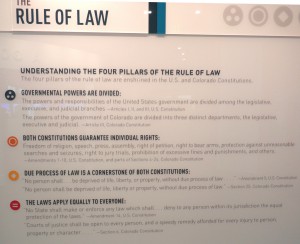 I recently visited the new Ralph Carr Colorado Judicial Center—the huge and incredibly expensive building complex that now houses the Colorado Supreme Court and Court of Appeals.
I recently visited the new Ralph Carr Colorado Judicial Center—the huge and incredibly expensive building complex that now houses the Colorado Supreme Court and Court of Appeals.
But even after spending $258 million, they couldn’t get one sign right.
An exhibit there has the worthy purpose of educating the public about the rule of law. The sign in question features what it calls “the four pillars of the rule of law:” divided powers, guarantees of individual rights, due process of law, and equal application of the law.
There are several defects in the sign. For example, instead of the repetitive quotes about “due process of law,” it would have been better to explain the term. To the Founders, “due process of law” meant that when government officials proceed against a citizen, they have to follow pre-existing procedures; they are not allowed to make up the rules as they go along.
But the biggest defect is a SCREAMING omission in the sign’s explanation of divided powers: “The powers and responsibilities of the United States government are divided among the legislative, executive, judicial branches.”
Whoa! What about federalism—reserving most governmental authority to the states? Better to have said, “Power is divided between the states and the federal government, and both state and federal powers are split among legislative, executive, and judicial branches.”
- The Colorado Supreme Court’s Decision Disqualifying President Trump - December 28, 2023
- The Highly Political and Misunderstood Case of Moore v. Harper - July 20, 2023
- The real Commerce Clause – as the Founders knew it - December 20, 2022
